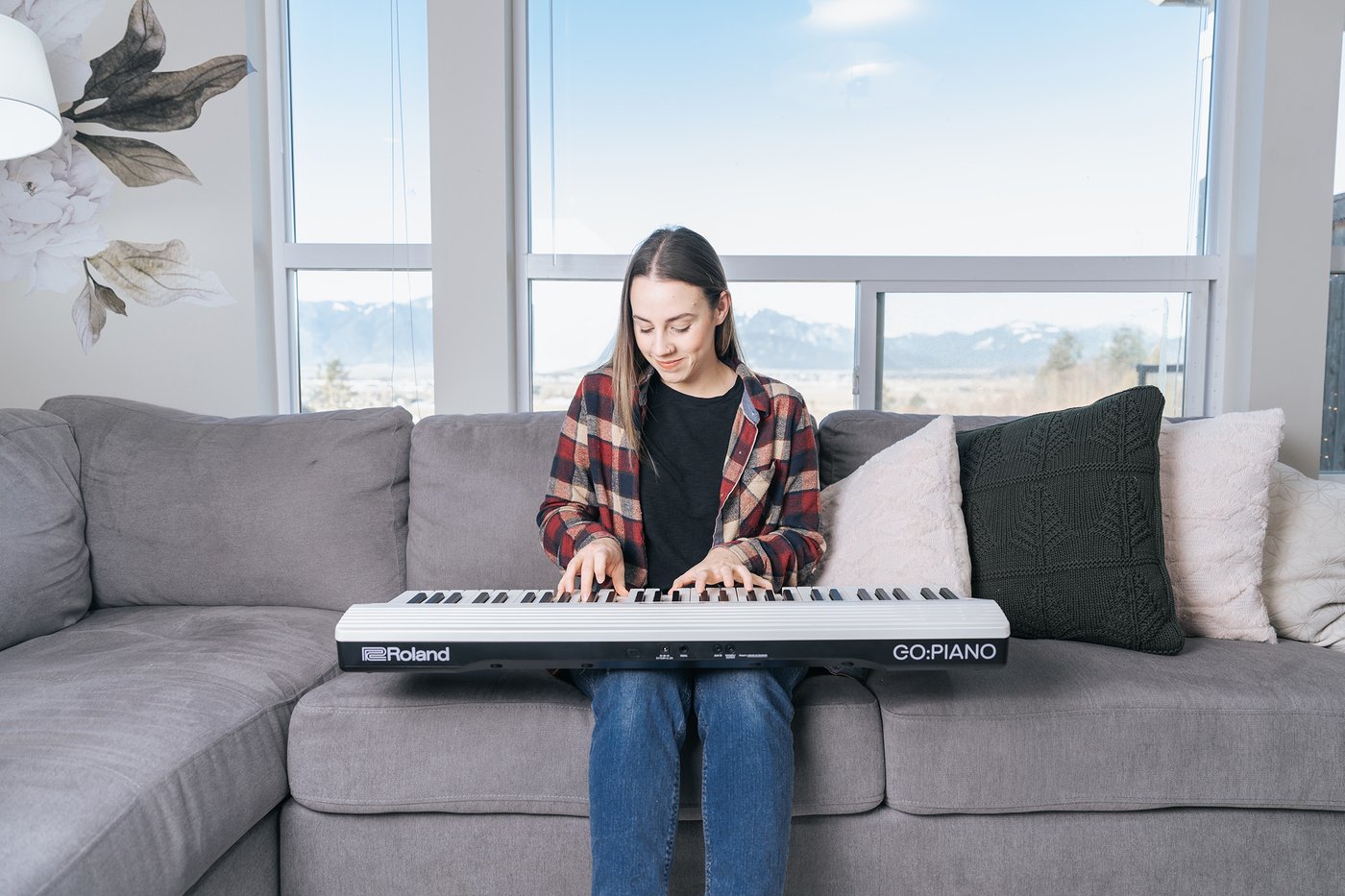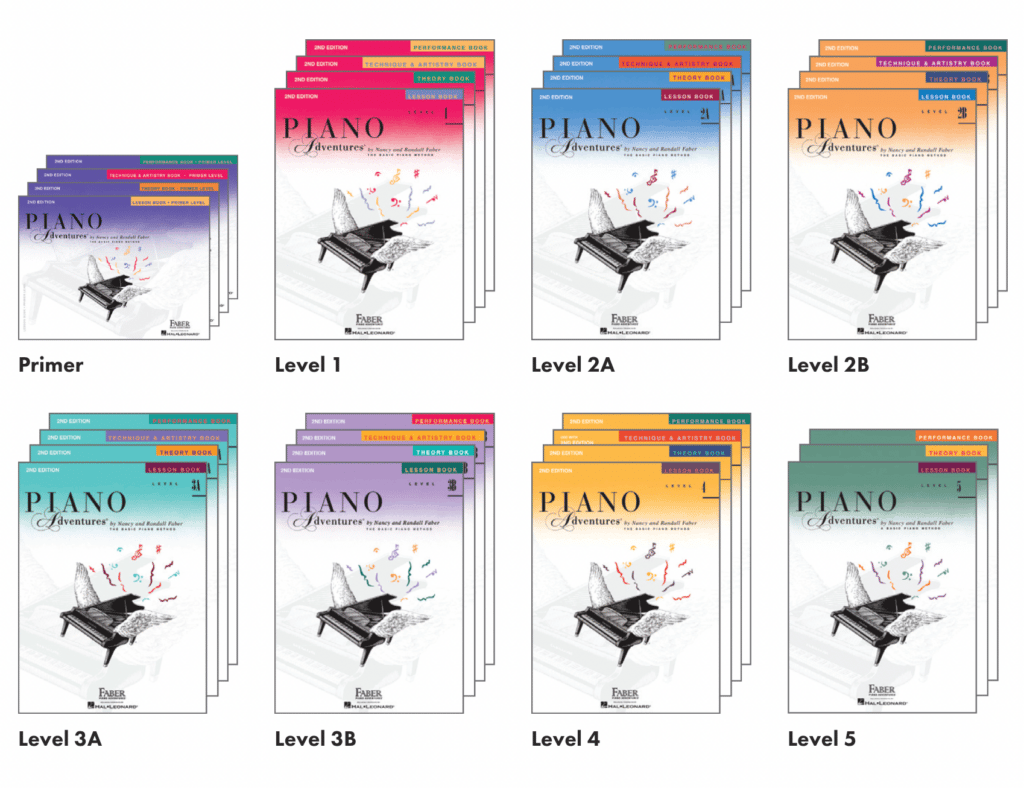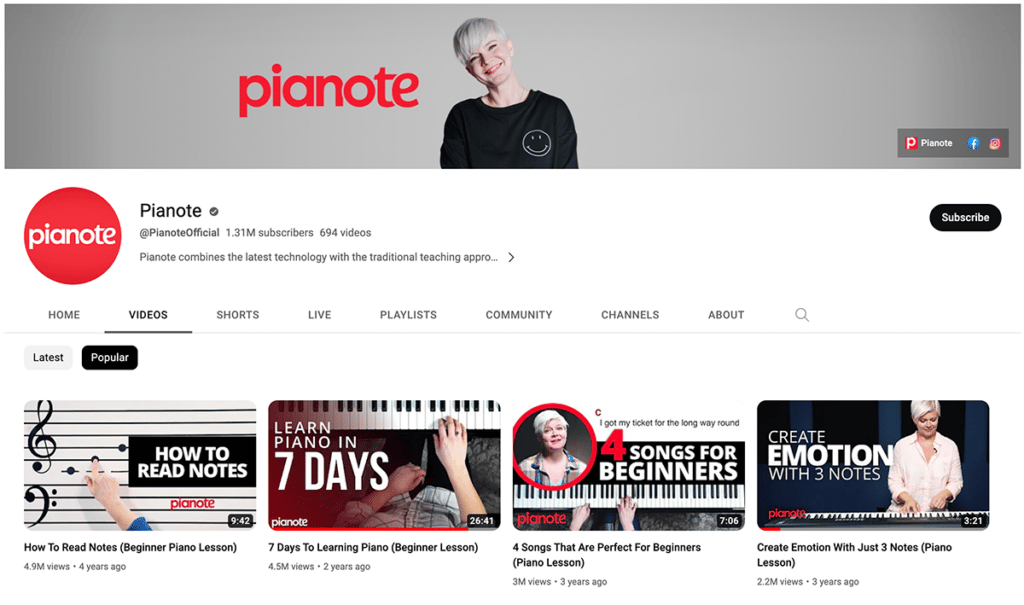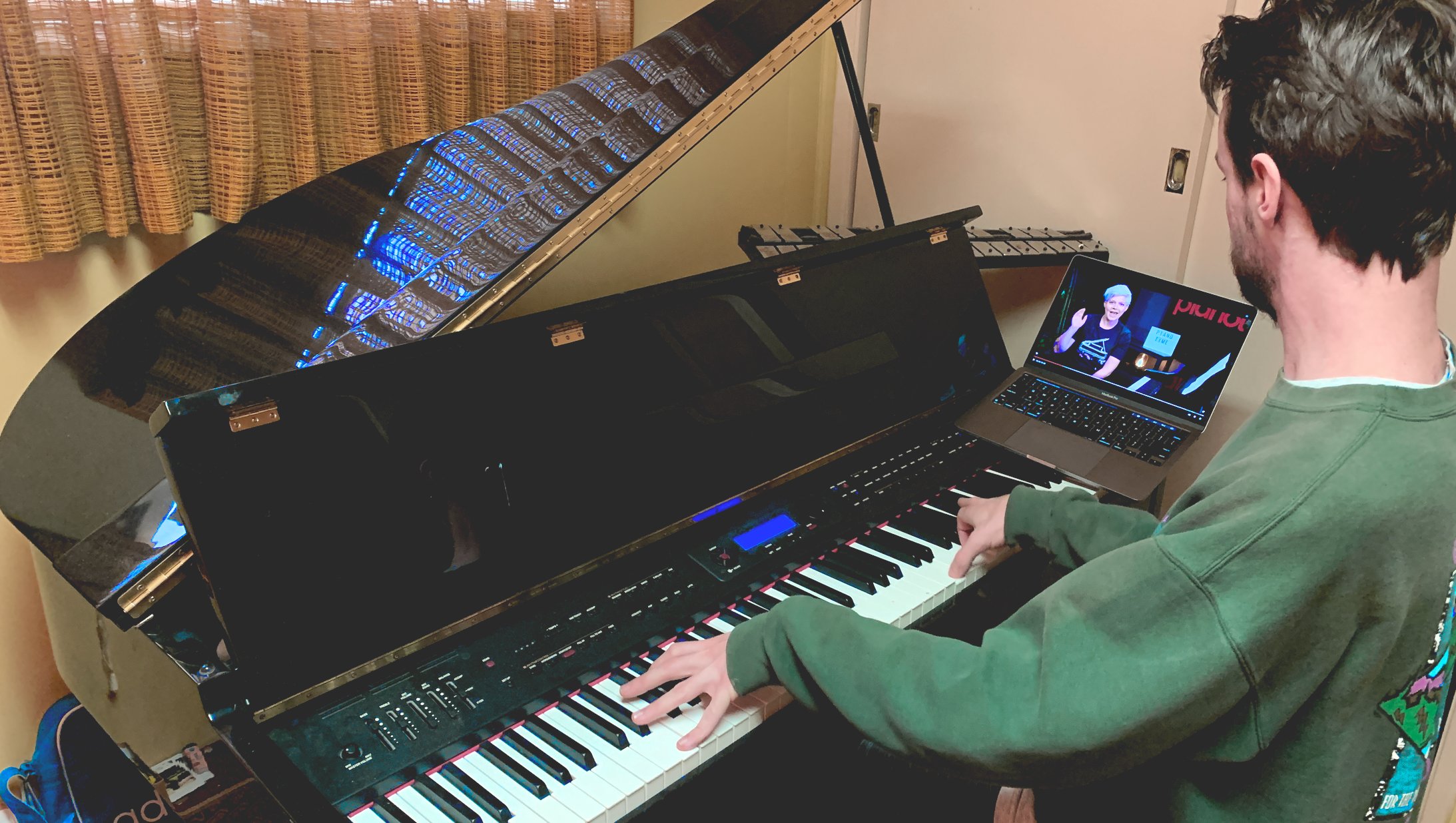
What’s the best way to learn piano? There have never been so many options! From traditional methods like in-person teachers to more modern options like online courses, you can now learn music in ways that save money and time. But it can also be overwhelming for beginners to choose the “right” way to learn because there you have so many choices.
In this post, we’ll break down the pros and cons of different methods, from traditional piano teachers to “video game style” learning and everything in between.
Subscribe to The Note for exclusive interviews, fascinating articles, and inspiring lessons delivered straight to your inbox. Unsubscribe at any time.
Before we start, a disclaimer: at Pianote, we make online piano lessons, including free lessons you can find on YouTube and a more structured method in our paid Members Area. We’re obviously biased toward our methods, but we’ve tried to be as objective as possible in this article. Take this as a review written by piano players, for piano players.

Today, many piano players still believe that the one-on-one model of teaching piano is the best method. After all, people have been learning piano like this for generations. The advantages are obvious: students get one-on-one attention and get individual advice tailored to their unique needs.
But this method isn’t for everyone. Private teachers aren’t cheap and require commuting. You (typically) won’t see your teacher every day, so you can’t ask them questions right away.
Many teachers still use traditional teaching methods that focus on classical music, standard notation, and solo playing. You can find teachers who specialize in pop, jazz, playing by ear, and ensemble playing, but they can be harder to find depending on where you live.
| Piano Teacher – Pros 👍 | Piano Teacher – Cons 👎 |
|---|---|
|
|
The most important thing is to be specific about the piano teacher you choose. You want someone who respects your time and is in line with your goals.

The Saint Petersburg Conservatory in Russia was attended by composers like Tchaikovsky, Prokofiev, and Shostakovich.
Music centers, such as those associated with a music retailer or community center, are another great place to have in-person lessons.
The advantage of music centers is that the teachers there have to be qualified to be hired. They’re legit! There may also be group lessons available that are more affordable. However, private teachers at music centers can be more expensive.
How about conservatories? Conservatories are kind of like universities for music students. Typically, they’re for very serious music students who want a degree in music and/or a career in performing.
| Music Centers – Pros 👍 | Music Centers – Cons 👎 |
|---|---|
|
|
The classical teaching method is the most common way to learn piano. It emphasizes reading sheet music and playing mostly classical repertoire.
But over time, some musicians have chosen a more modern method where you learn that chords and chord progressions are the building blocks of music. This approach emphasizes using your ear over using sheet music, and is best for learning pop songs. Understanding how chords work also prepares you well for jazz.
There is no right or wrong method—the right method is whichever suits you! If you want to play Debussy and Chopin, go with a method that teaches you how to read notation. But if you want to play Billy Joel and Lady Gaga, it’s more useful to learn chords.
> Classical vs. Modern Piano Lessons: What’s the Difference?

Faber Piano Adventures is a popular series for young piano players.
This is a method that appeals to many adult learners, especially those who already have some musical experience. Books are affordable and they guide you step-by-step through the learning process while letting you set the pace. Today, there are many method books available and each can appeal to a different type of student. One suggestion is to go to your local library, check out different method books, and see which one works best for you!
| Self-Teaching Through Books – Pros 👍 | Self-Teaching Through Books – Cons 👎 |
|---|---|
|
|

Not sure if you’re ready for a Pianote Membership? Check out our free lessons on YouTube.
Today, you have the entire world of music education at your fingertips thanks to the Internet. And many of these resources are 100% free.
On YouTube, you can learn how to fix a toilet from a professional plumber. Similarly, you can learn how to play “Halo” from Beyoncé’s touring pianist…for free! If you type in “how to play [insert song/technique/theory concept here]” chances are someone, somewhere will have a tutorial for you.
Now, it can be overwhelming to have so many things available to learn, and beginners may want more structure to guide them. That being said, free tutorials are free, and that’s a huge advantage worth exploring.
We believe free tutorials are best for “quick wins”—song tutorials, tricks to improvise with just a handful of notes, and practice ideas. Don’t underestimate the power of quick wins: they can be useful to beginners and advanced pianists alike to break out of a rut, get inspired, and try something new.
| Free Online Tutorials – Pros 👍 | Free Online Tutorials – Cons 👎 |
|---|---|
|
|

Examples: Yousician, Simply Piano, Flowkey, Skoove
A method that’s gotten very popular recently is so-called video game style learning. This type of learning is very fun! It’s just like Guitar Hero: graphics of notes fly across the screen, you play them on time, and you’re scored based on your accuracy. It can be addicting, motivating, and you learn a real skill at the same time! Who said video games are a waste of time?
Today, computers can do a lot, including rating you on your accuracy and speed. What they can’t do is give you nuanced advice on technique, rhythm, and expression. After all, music is a lot more than pressing buttons. And while some of these programs teach you how to sit properly at the piano, this isn’t the same as an instructor giving you advice.
Still, these programs are an excellent introduction to playing music. Many will teach you theory concepts like chords and rhythm. So, for casual learners who just want to have fun, there’s nothing wrong with video game style learning!
Hear how other piano players think of video game learning:
| Video Game Style Learning – Pros 👍 | Video Game Style Learning – Cons 👎 |
|---|---|
|
|

Examples: Piano With Jonny, Tonebase, Open Studio, Masterclass, Pianote (us!)
The “membership model” is sort of like an online class. Piano lessons are hosted online but aren’t necessarily app-based. These programs may offer both an “à la carte” experience where you pick and choose what courses to take, or a more structured lesson plan for those who enjoy more structure.
Some platforms include extras like “practice-along” features, tempo control, and looping functionality so you can target weak spots.
While this method doesn’t include the one-on-one attention of a teacher, on a platform like Pianote you can submit recordings of your performance and get reviewed by a real teacher. Some platforms also offer live masterclasses.
But the best part about this model is the community that comes with them. Playing piano is often thought of as a solo activity, but there is SO MUCH value to be had from having a community of piano learners and teachers around you. It’s one of the most popular aspects of Pianote.
Of course, don’t take it from us. Hear what other musicians think of Pianote:
You can also take a peek at our membership area here.
| Membership Model Online Lessons – Pros 👍 | Membership Model Online Lessons – Cons 👎 |
|---|---|
|
|
We all learn differently, so take some time to explore what works for you. Many online platforms offer free trials, so try out a few programs.
Another important thing is to find a platform that matches your style. For example, Tonebase is tailored to classical players, while Open Studio specializes in jazz. In Pianote, we have a little bit of everything, including a classical learning path and a more chord-based method that will get you playing pop songs quickly.
Finally, you don’t have to stick to one method! You can use an online method and check in with a local teacher once a month. This compromise saves money and time while giving you the benefits of both approaches.
At the end of the day, it’s about what works for you and your goals. And make sure you’re having fun! That’s the most important thing 🙂
As a Pianote Member, you’ll get access to our 10-step Method, song library, and growing community of piano players just like you. Plus: get coached by world-class pianists and learn whenever you want, wherever you want, and whatever you want.
TRY PIANOTE FOR 7 DAYSCharmaine Li is a Vancouver writer who has played piano for over 20 years. She holds an Associate diploma (ARCT) from the Royal Conservatory of Music and loves writing about the ways in which music—and music learning—affects the human experience. Charmaine manages The Note. Learn more about Charmaine here.
/marketing/pianote/promos/april/banner-bg-m.webp)
We use cookies for traffic data and advertising. Cookie Policy »
/marketing/pianote/promos/april/banner-title.webp)